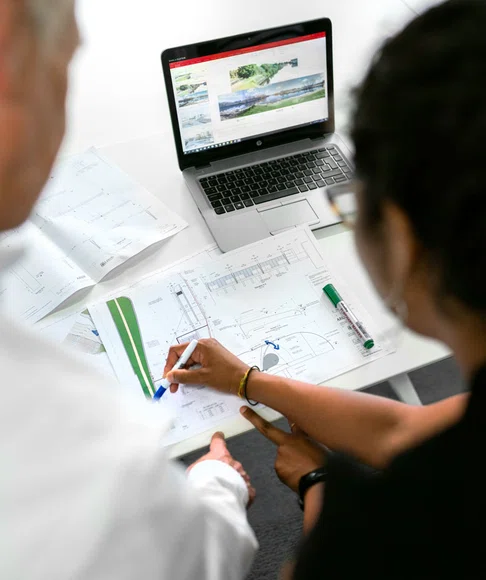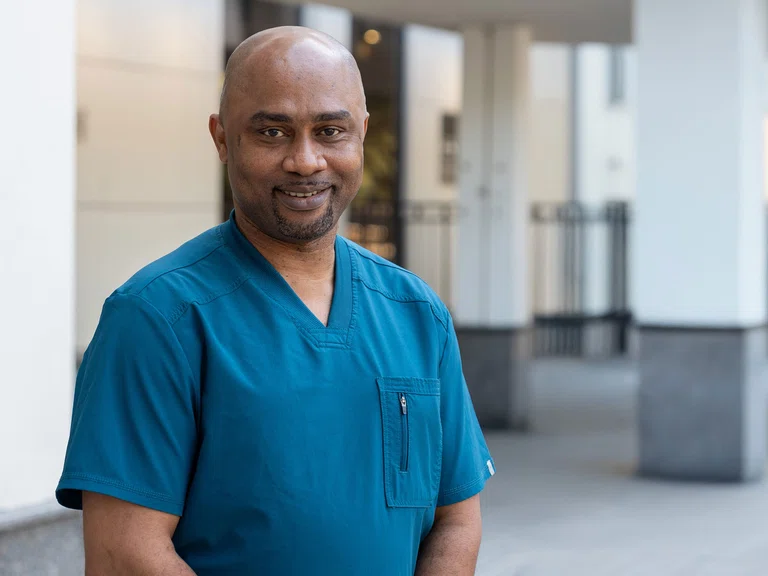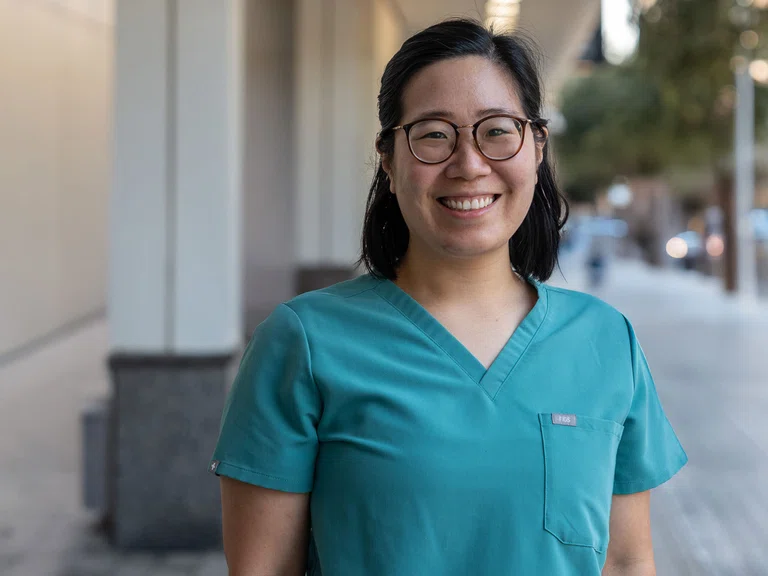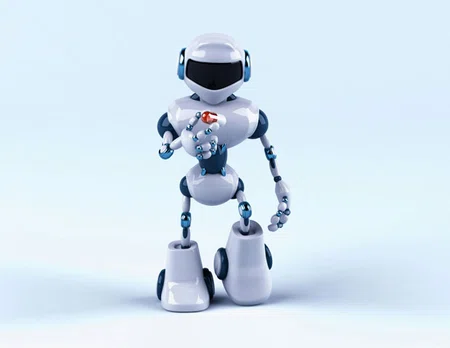© 2024. Houston Methodist, Houston, TX. All rights reserved.


In this
issue

WELCOME
NURSING SCIENCE

Robotic Tutor for Nursing

AI's Role in Nursing

Assessing the Knowledge and Attitudes of Registered Nurses About Artificial Intelligence in Nursing and Health Care
EDUCATION
PRACTICE

The Day in a Life of a Virtual Nurse and a Bedside Nurse

Enhancing Nursing Efficiency and Satisfaction with Smart Room Technology
PROFESSIONAL DEVELOPMENT

My Journey in Nursing: Into the Virtually Unknown

Engineered for Care: How Former Engineers Are Innovating Nursing
MAGNET
FROM OUR TEAMS

ABOUT DISCOVERN
Professional Development
Engineered for Care: How Former Engineers Are Innovating Nursing
A Q&A With Valentine Ibe, Patty Soong and Daniel Kerr
A Q&A With Valentine Ibe, Patty Soong and Daniel Kerr

Engineering and nursing may seem worlds apart, yet the stories of Valentine Ibe, Patty Soong and Daniel Kerr showcase the powerful intersections between these two professions. These three remarkable nurses at Houston Methodist transitioned from problem-solving in the technical world to caring for patients in the clinical realm, bringing unique perspectives and skills to their roles. In this interview, they share their journeys—from their previous careers in engineering to finding fulfillment in nursing—and how their backgrounds continue to shape their approach to patient care, problem-solving and innovation in healthcare.
Tell us your role and where you work at Houston Methodist. How long have you worked at Houston Methodist?

Valentine Ibe: I am an RN III, Staff Nurse and Alternate Charge Nurse on Fondren 11. I have worked at Houston Methodist for three years and six months.

Patty Soong: I work as an RN III on Dunn 10 East, a Solid Organ Transplant Unit. I completed one year as a MAPP intern in 2020 and then started as a GN in 2021. It’ll be a total of five years soon!

Daniel Kerr: I serve as the Professional Practice Leader for the Cardiovascular Intensive Care Unit at Houston Methodist Hospital. I’ve had the privilege of working here for the past 11 years.

Growing up in a small community in Nigeria, I always wanted to do something challenging in my career that could make a difference in people’s lives.
-Valentine Ibe
Can you tell us about your previous career in engineering? What field were you in, and what was your role?

Valentine: My engineering career spans many fields and roles. First, I started as a process engineer in the biggest refinery in Nigeria, Port Harcourt Refinery Limited Alesa Eleme and then as a Safety Engineer at Landmark Gas Company. I have strong skills in process control and safety, risk management, unit operations, process thermal design, combustion technology, hydrocarbon condition (oil and gas processing), hazard identification and analysis, finite element analysis, data interpretation and report generation, offshore engineering, petroleum production, petroleum refining, drilling, P&ID and sizing calculation, process and plant design, project management and safety engineering.

Patty: After I received my Bachelor of Science in Chemical Engineering, I worked as a production engineer for five years in the petrochemical industry at a chemical plant and helped daily monitor operations and diagnose process issues. I also worked on projects to help improve production and meet safety and quality goals.
Daniel: I have a degree in Biomedical Engineering, but the field was still emerging at the time. As a result, I worked in cost engineering for an oil and gas construction company. However, I soon realized that the work wasn’t aligned with my passions, which led me to seek a more fulfilling path.
What motivated you to pursue a career in nursing? Was there a specific moment or experience that sparked your interest?

Valentine: Growing up in a small community in Nigeria, I always wanted to do something challenging in my career that could make a difference in people’s lives. I had early contact with the healthcare profession as a volunteer. At that time, nursing was never an option for me because, in Nigeria, nursing was perceived as a profession for only females. The fact that Nigeria's economy is predominantly oil and gas made it an easy decision for me to choose engineering. My journey to becoming a nurse began in 2014 when oil prices were very low. Having relocated to the United States in 2011, oil prices were great and subsea engineering (a branch of oil and gas that deals with the design, production, and construction of oil and gas installations in deep sea/offshore environments) has a lot of potential. I returned to school for a few months to obtain a graduate certification in subsea. Until 2014, I enjoyed my time in oil and gas. With the crude oil price crash in 2014, many people were laid off especially in the subsea sector, mainly because it is very capital intensive and most subsea companies could not operate with the oil price back then. It took me about a year to decide to go into nursing. The initial decision was difficult, but with the support of my family especially my spouse, who is also a nurse, and my desire to make a difference in people’s lives, I transitioned to nursing.

Patty: My mother passed away in 2017 after battling stage 4 primary peritoneal cancer for two years. The palliative care unit nurses who took care of her in the last few days of her life were so compassionate and supportive through the hardest of times. I valued the holistic nursing care approach they gave my mother and the rest of my family. This experience made me recognize that I wanted to do something more meaningful with my career and tangibly help people.
Daniel: I was eager to return to the medical field and engage in work that made a difference in people’s lives. As a volunteer firefighter, I frequently assisted paramedics on medical calls, which sparked my interest in healthcare, particularly nursing.
What was the process like for you, transitioning from engineering to nursing? How did you prepare for the change?

Valentine: The process was seamless; however, deciding to be a nurse was the most challenging part. I enrolled in an accelerated BSN program at The University of Texas at Arlington. I enjoyed most of the nursing courses. Cardiology was my favorite subject in nursing school mainly because I always viewed the heart and blood vessels as pumps and pipelines, which are very similar concepts with few differences. For the most part, the concepts are the same, but both used different terms and language to explain the same idea. Until now, I still sometimes used engineering terms to describe some healthcare concepts.
Patty: Changing careers felt very natural. I was already used to waking up early, wearing a uniform, participating in a shift huddle and working in a unit. One big difference is that humans are more unpredictable and confusing than machines!
Daniel: The transition felt natural in many ways. Nursing school is built upon scientific principles I had already learned through engineering, especially in areas like hemodynamics, where my understanding of fluids and flow proved invaluable. The most challenging aspect was not being able to work during nursing school, but I was fortunate to have the unwavering support of my wife and family throughout the journey.

Changing careers felt very natural. I was already used to waking up early, wearing a uniform, participating in a shift huddle and working in a unit. One big difference is that humans are more unpredictable and confusing than machines!
-Patty Soong
What drew you to Houston Methodist when transitioning to nursing? How has the experience met or exceeded your expectations?
Valentine: Houston Methodist is one of the best employers. Even when I was in nursing school, I always knew that Houston Methodist was the best place for me to work and grow as a nurse. After graduation and starting my nursing career with another healthcare facility, my desire to work with Houston Methodist remained strong. I humbly jumped at the first opportunity to work at Houston Methodist in 2021. Ever since, my experience has been tremendous and fulfilling and has exceeded my expectations. All thanks to the Fondren 11 management and staff, especially my director and manager, who saw something positive and believed in me.
Houston Methodist recognizes and rewards hard work and dedication. In my first year as a bedside nurse in Fondren 11, I received the Daisy Award for excellence in patient care. Since then, I have grown to be one of the leaders in the unit and have assumed more responsibilities, among them being a secondary charge nurse and chairman of the patient satisfaction council. I also was the inaugural recipient of the Nursing Science fellowship (a two-year program designed to guide nurses through the development, implementation and dissemination of nursing inquiry initiatives), which includes nursing science projects, journal club, peer mentoring, and more.
Patty: Houston Methodist has an excellent reputation in Houston. My first clinical instructor in nursing school was an employee at Houston Methodist. She loved her job and all the support they gave her as she pursued her PhD. I don’t know what it’s like at other hospitals since I’ve only worked here. However, I was impressed by Houston Methodist’s response to the COVID-19 pandemic and engagement with the community to get the public vaccinated.
Daniel: I had the opportunity to complete my high-acuity clinical rotations in the CVICU at Houston Methodist. I knew immediately this was where I wanted to be. The culture, teamwork and commitment to excellence have far exceeded my expectations—it’s truly the best place to work.
How did your background in engineering shape your approach to patient care and problem solving in nursing?
Valentine: With my engineering background and experience working on team-based projects, I understand the importance of being a team player. I can work well under pressure, and I am very analytical when it comes to patient care.
Patty: I think my background as a chemical engineer has been helpful because I am accustomed to interpreting data to figure out what’s happening. So, with a patient, I use lab values and vital signs to monitor trends to help me think analytically and put the pieces together to get an idea of how a patient is doing clinically. As an engineer, I also value efficiency and optimization, so I always try to be efficient with my time and my patient’s time.
Daniel: Engineering teaches you to analyze problems and devise solutions for systems that aren’t functioning optimally. In nursing, many issues stem from inefficient or flawed processes. My engineering background helps me approach patient care with a systems mindset, seeking long-term solutions that improve safety and efficiency.
Given your engineering perspective, how do you think technology and innovation could further transform nursing care?
Valentine: I believe health care and engineering, especially chemical engineering, have so much in common. Some engineering principles can be applied to healthcare, but the main obstacle is the standardization of language and terms. Healthcare and engineering use different terms to explain the same concept; hence, it is difficult to transfer skills. Also, I think nurses should be more involved in the initial design of healthcare innovations as their input as end users will be critical. I also think engineering is more advanced in hazard identification and risk analysis techniques such as hazard and operability studies (HAZOP) and layers of protection analysis (LOPA). Nurses can utilize some of those engineering techniques to improve fall risk assessments and other risk assessments in healthcare. Engineering knowledge of fluid dynamics can be beneficial in designing healthcare equipment like LVAD equipment, IV pump design, etc. There are a lot of areas of cooperation and a lot is ongoing already, but more still needs to be done.
Patty: I think technology and innovation can be used to make things more efficient and safer for both patients and nurses. Robotics and automation could handle more routine tasks like dispensing and crushing medications. This frees up time for the nurse to focus on more critical aspects of care, like catching and reacting to changes in a patient’s condition or even just spending time with the patient providing compassionate care. As an engineer, I focused on optimizing production while meeting safety and quality goals, so I value efficiency with safety in mind. Nurses already have so many tasks to do, so making these tasks less time consuming is ideal.
Daniel: We’re at the forefront of a technological revolution in healthcare, where documentation of vitals and device parameters are becoming automated. However, nurses remain critical in interpreting these data points and anticipating patient deterioration. The next step is integrating predictive analytics to identify early warning signs and notify nurses before a patient’s condition worsens. I’m excited to see how these innovations will further enhance patient care.
What differences and similarities have you observed between the work cultures in engineering and nursing, particularly in teamwork and problem-solving approaches?
Valentine: The main difference is the level of social interactions. Nurses interact with different levels of people, patients, patient families and other healthcare workers daily. While engineers, in most cases may collaborate with others on a project, the level of interaction is much less for engineers than nurses. Engineers are more analytical and think through problems before deciding on the best solution. Secondly, engineers tend to focus more on the return on investment, profit and safety, while nurses focus more on patient safety and patient experience.
Like engineering, both nursing and engineering require teamwork. Most engineering projects are group projects that require input from many other professionals. For instance, engineers working in oil field development will rely on information from a geophysicist, geologist, reservoir engineer, drilling engineer, production engineer, process engineer and cost engineer to decide whether the field is economically viable. Similarly, nurses must rely on other healthcare providers like lab technicians, physicians and pharmacists to make healthcare decisions.
Patty: Both work cultures require a lot of teamwork and multidisciplinary collaboration. Effective communication is also precious. Both work cultures can be creative—I love a good nursing hack! However, the work cultures vary because engineering is typically more project-based, while nursing often times feels like we’re constantly putting out little fires. This makes it harder to focus on the bigger picture because I feel like nurses are so stressed out thinking about so many different things at once about their patients.
Daniel: Collaboration is essential in both fields. Whether in engineering or nursing, the most effective solutions come from working together. In both settings, silos disrupt workflow and diminish teamwork. Cross-disciplinary collaboration fosters stronger, more cohesive problem solving.
How has your experience in engineering helped you navigate the complexities of healthcare systems and nursing workflows?
Valentine: My engineering experience has been beneficial. One of the main principles in engineering design is to design for the worst possible scenarios. If an engineer wants to create an excellent casing to accommodate a formation pressure of 10 PSI, it is normal for the engineer to consider the worst possible pressure the well can experience and make accommodations for that in the casing design. With that mindset, I always approach patient care with an open mind, bearing in mind that I will meet patients with a wide range of cultural differences and backgrounds. In addition, with the support from the Fondren 11 team and the management, my experience in navigating the complexities of the healthcare system was seamless.
Patty: My engineering background made it easier for me to connect the dots and systematically examine the nursing workflow. Regarding navigating the complexities of healthcare systems, I realized that it was similar to my prior working experiences, where you must figure out how to ask the right questions to the right people to get the answers you need. There is also a big emphasis on the importance of documentation in engineering, an important aspect of the nursing workflow.
Daniel: My engineering background has given me a firm grasp of technology, from understanding how monitors and pressure transducers function to using tools like Excel to analyze data. I apply this daily to investigate errors or adverse patient events, using data-driven insights to implement solutions that benefit our staff and patients.
Nursing is incredibly diverse, constantly evolving and full of opportunities to learn and grow. Whether you’re drawn to clinical care, leadership, research, or education, there’s always a place for you in nursing. Nursing is a field worth exploring if you’re looking for a dynamic, impactful career.
-Daniel Kerr
What advice would you give other professionals considering a similar career change to nursing?
Valentine: My advice is to think it through and make sure you have a strong desire to help others and compassion for your patients. Nursing can be stressful, and your ability to manage and handle stress is vital for your success as a nurse.
Patty: If you’re interested, then do it! If you feel you are missing out on fulfilling human interactions or wish to help people more, nursing is a great field to switch to.
Daniel: Nursing is incredibly diverse, constantly evolving and full of opportunities to learn and grow. Whether you’re drawn to clinical care, leadership, research, or education, there’s always a place for you in nursing. Nursing is a field worth exploring if you’re looking for a dynamic, impactful career.









